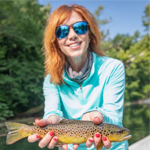Fly Fishing Tips For Beginners
By Anietra Hamper
Oct 17, 2022
A beginner’s guide to fly fishing with tips on basic gear, how to hire a guide and tips for fly fishing in lakes, streams, and rivers.
There’s a reason that fly fishing anglers are so passionate about their sport – it is one of the most rewarding ways to get outdoors and get in tune with nature. The skills and techniques involved with fly fishing require some practice but do not let that intimidate you. The payoff is wandering in pristine streams and experiencing the thrill of catching a beautiful rainbow trout or native wild brown trout. When you’re ready to move onto bigger water you can put salmon and other species onto your radar.
One of the best fly-fishing tips for beginners is to keep it simple. Start with the basics and like any new hobby, let it evolve naturally as you learn fly fishing techniques, understand the species and feeding habits, casting and the various habitat environments on rivers, streams, and lakes.
Put your patience and a valid fishing license into your daypack and follow our fly fishing tips for beginners.
Hiring a Guide
If you have never fly fished before it is a good idea to hire a guide who can help you learn proper techniques from the start. A guide can offer beginners basic fly-fishing tips and tricks and provide expertise even to experienced anglers who are trying out new waterways. A guide can offers casting tips which is essential for proper fly presentation and advise on proper fish handling and releasing them back into the water. Learning how to fly-fish without proper instruction can instill bad habits from the start that are difficult to un-learn.
When hiring a guide, ask for recommendations and look for guides who know the waterways well. An experienced guide will help you to have a successful day on the water and provide you with valuable skills for moving forward in your fly-fishing journey.
You might be wondering how much to tip a fly-fishing guide. Generally, tipping 20-percent of the cost of the trip is the norm but you can always tip more.
Basic Fly-Fishing Gear
To get started fly fishing you will need some basic gear. You will want to invest in a fly rod and reel, some waders and boots, a variety of flies suitable for where you plan to fish and polarized sunglasses.
Your gear will change depending on whether you are fishing in tight spaces on a small stream in the forest or from the banks of a river with faster water. You will match your rod to the locations and size of water you are fishing. The larger the waterway, the heavier rated rod and line that is needed.
If you are just getting started it is best to rent gear or borrow it from a guide before investing in your own equipment. Fly fishing is an investment as your skills and interest grow, so start small and go out on the water a few times before making that commitment.
Stream Fly Fishing Tips
Streams are some of the most popular waterways for fly fishing. Whether you head to North Carolina’s mountain trout streams or the Wyoming wilderness, small streams will get you the most immersed into the outdoors and onto undisturbed waters.
Most of the fish you catch in streams are small and you will find them in cold water in the northern states and higher elevations in southern states. In streams and rivers looks for pools, riffles, and runs where fish are often are located. Keep in mind that when fishing from the bank and wading, the fish can see you and are easily spooked by your movements in the water.
River Fly Fishing Tips
It is important to be able to read the water no matter where you fly-fish, but it is especially true for rivers that have fast-moving currents and other dynamics that impact the fishing. You want to look for crease water which are areas where fast water meets slower water and provides ideal feeding spots for the fish.
Lake Fly Fishing Tips
Fly fishing on rivers and streams is more technical, so stocked lakes offer beginners the opportunity to catch fish more easily as you gain experience. It is a good way to practice casting because you can fish from a boat without restrictions on your back cast. Lake fishing also gives you opportunities to fish for many other species like bass, walleye, perch, and pike.
One of the best ways to familiarize yourself with some of the fly-fishing basics before you go out onto the water is by taking a free fly-fishing classis from places like Orvis or online tutorials.









